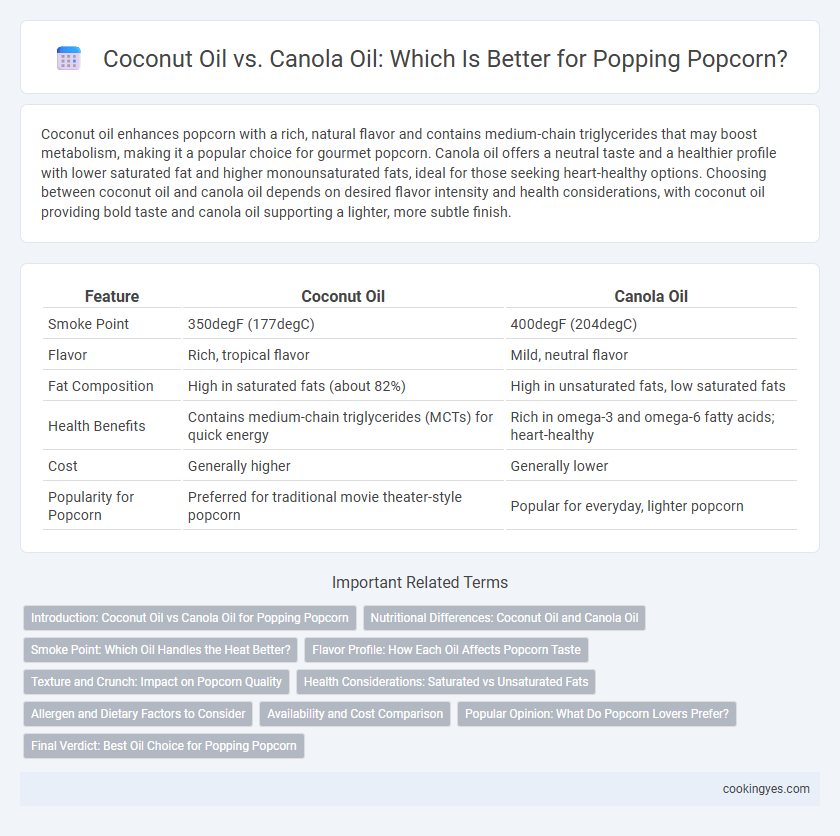Coconut oil enhances popcorn with a rich, natural flavor and contains medium-chain triglycerides that may boost metabolism, making it a popular choice for gourmet popcorn. Canola oil offers a neutral taste and a healthier profile with lower saturated fat and higher monounsaturated fats, ideal for those seeking heart-healthy options. Choosing between coconut oil and canola oil depends on desired flavor intensity and health considerations, with coconut oil providing bold taste and canola oil supporting a lighter, more subtle finish.
Table of Comparison
| Feature | Coconut Oil | Canola Oil |
|---|---|---|
| Smoke Point | 350degF (177degC) | 400degF (204degC) |
| Flavor | Rich, tropical flavor | Mild, neutral flavor |
| Fat Composition | High in saturated fats (about 82%) | High in unsaturated fats, low saturated fats |
| Health Benefits | Contains medium-chain triglycerides (MCTs) for quick energy | Rich in omega-3 and omega-6 fatty acids; heart-healthy |
| Cost | Generally higher | Generally lower |
| Popularity for Popcorn | Preferred for traditional movie theater-style popcorn | Popular for everyday, lighter popcorn |
Introduction: Coconut Oil vs Canola Oil for Popping Popcorn
Coconut oil and canola oil differ significantly in flavor, smoke point, and health benefits when used for popping popcorn. Coconut oil imparts a rich, buttery taste and has a higher saturated fat content, while canola oil offers a neutral flavor with a higher smoke point and more heart-healthy unsaturated fats. Choosing between these oils depends on desired taste profile and nutritional priorities for popcorn preparation.
Nutritional Differences: Coconut Oil and Canola Oil
Coconut oil contains higher saturated fats, primarily lauric acid, which may raise HDL cholesterol, while canola oil is rich in heart-healthy monounsaturated fats and omega-3 fatty acids. Canola oil offers a lower saturated fat content and provides vitamin E, an antioxidant that supports cellular health. Choosing between the two oils depends on dietary goals, with coconut oil favoring flavor and canola oil supporting cardiovascular wellness.
Smoke Point: Which Oil Handles the Heat Better?
Coconut oil has a smoke point of around 350degF (177degC), making it suitable for popping popcorn at moderate temperatures while adding a distinct flavor. Canola oil features a higher smoke point of approximately 400degF (204degC), enabling better heat tolerance and less risk of burning during high-temperature popping. Choosing canola oil provides more stability under heat, while coconut oil offers unique taste benefits but requires careful temperature control to avoid smoke.
Flavor Profile: How Each Oil Affects Popcorn Taste
Coconut oil imparts a rich, slightly sweet flavor that enhances the classic movie theater popcorn taste with a hint of tropical aroma, making it a favorite for those seeking a buttery, indulgent profile. Canola oil, with its neutral and mild flavor, allows the natural popcorn taste to shine without overpowering, offering a cleaner, lighter option ideal for those preferring less oil influence. The choice between coconut and canola oil significantly impacts the overall flavor experience, with coconut adding depth and canola maintaining simplicity.
Texture and Crunch: Impact on Popcorn Quality
Coconut oil creates a richer, crunchier texture in popcorn due to its high saturated fat content, which enhances the popping process and results in a crispier kernel. Canola oil, with its lighter, unsaturated fat profile, produces a less crunchy texture but offers a cleaner flavor and is often preferred for health-conscious consumers. The choice between coconut oil and canola oil significantly influences popcorn quality, with coconut oil favored for superior texture and mouthfeel.
Health Considerations: Saturated vs Unsaturated Fats
Coconut oil is predominantly composed of saturated fats, which can raise LDL cholesterol levels and potentially increase heart disease risk when consumed in excess. Canola oil contains mostly unsaturated fats, including heart-healthy monounsaturated and omega-3 fatty acids, contributing to improved cholesterol profiles and cardiovascular benefits. Choosing canola oil for popping popcorn supports better heart health due to its favorable fatty acid composition compared to the high saturated fat content in coconut oil.
Allergen and Dietary Factors to Consider
Coconut oil is a popular choice for popcorn due to its allergen-friendly profile, being free from gluten and common nut allergens, making it suitable for those with specific dietary restrictions. Canola oil, although low in saturated fat and heart-healthy, may pose concerns for individuals sensitive to soy allergens if processed in facilities handling soy products. When selecting popping oil, consumers should consider dietary needs such as avoiding saturated fats or allergens like soy and seek certified allergen-free labeling for safe consumption.
Availability and Cost Comparison
Coconut oil is widely available in supermarkets and specialty stores but tends to be pricier due to its tropical sourcing and higher production costs. Canola oil, derived from rapeseed, is one of the most common cooking oils globally, offering greater availability and affordability for popcorn popping. Cost comparison reveals canola oil typically costs 30-50% less per liter, making it a budget-friendly choice for frequent popcorn preparation.
Popular Opinion: What Do Popcorn Lovers Prefer?
Popcorn lovers often prefer coconut oil over canola oil for its rich, buttery flavor and ability to create a crisp, evenly popped kernel. Coconut oil's high smoke point and natural aroma enhance the classic movie theater popcorn experience, making it a favorite among enthusiasts. While canola oil is praised for its neutral taste and health benefits, the majority of popcorn aficionados prioritize taste and texture, leading them to favor coconut oil for stovetop popping.
Final Verdict: Best Oil Choice for Popping Popcorn
Coconut oil enhances popcorn with a rich, natural flavor and creates a crispy texture due to its high saturated fat content, making it a favorite for traditional movie theater-style popcorn. Canola oil offers a neutral taste and contains healthier unsaturated fats, which appeal to health-conscious consumers looking for a lighter option. For the best popping oil, choose coconut oil if flavor and texture are priorities, while canola oil suits those seeking a heart-healthy alternative without overpowering taste.
Coconut oil vs Canola oil for popping oil Infographic

 cookingyes.com
cookingyes.com